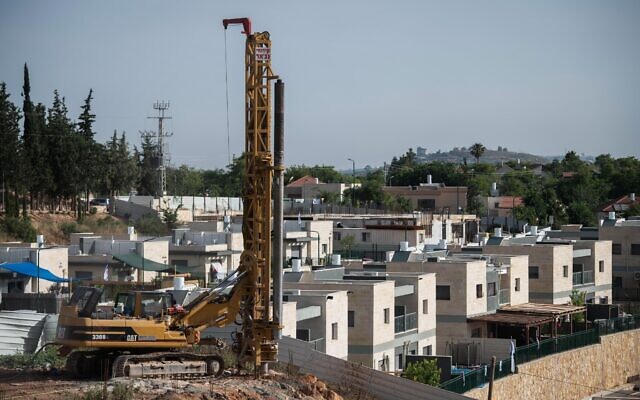State Dept. spokesman says recently announced plans for new homes ‘completely inconsistent’ with efforts to maintain calm; ‘We are deeply concerned’

The US on Tuesday gave what appeared to be its harshest public critique of Israeli plans to expand settlements in the West Bank since US President Joe Biden took office.
“We are deeply concerned about the Israeli government’s plan to advance thousands of settlement units on Wednesday, many of them deep in the West Bank,” State Department spokesman Ned Price said at a press briefing, four days after Israeli authorities published the agenda for an upcoming meeting of the Defense Ministry body that authorizes settlement building.
“We strongly oppose the expansion of settlements, which is completely inconsistent with efforts to lower tensions and restore calm. And it damages the prospects for a two-state solution.”
The Civil Administration’s High Planning Subcommittee is slated to convene this week to advance projects for 2,862 settlement homes in the West Bank.
Asked for comment on the matter last Friday, Price had issued a general statement against unilateral moves by both Israelis and Palestinians that has been issued dozens of times in the past year.
On Tuesday, the statement focused solely on Israel.
The State Department spokesman also expressed the Biden administration’s concern over the Sunday announcement by Israel’s Housing Ministry that it had published tenders to build 1,355 new housing units in seven different settlements across the West Bank — the first such development since Biden took office.

The publication of tenders is an additional step that is required for projects in larger settlements before ground can be broken.
“We also view plans for the retroactive legalization of illegal outposts as unacceptable,” Price said Tuesday, without specifying what he was referring to.
A recent state government review determined that the illegal Evyatar outpost erected over the summer in the West Bank was built on what Israeli authorities consider to be state land. The government had previously struck an agreement with the Evyatar squatters that they would legalize the wildcat outpost if it was found to be on state land.
Price added that US officials “continue to raise our views on this issue directly with senior Israeli officials in our private discussions.”
After a reporter noted that the statement was the furthest the Biden administration has gone on the issue, Price responded, “Our public messaging on this is consistent with what we are seeing transpire.”

Last week, after the High Planning Subcommittee published its agenda for its upcoming session, the United States Embassy in Jerusalem’s chargé d’affaires Michael Ratney called Prime Minister Naftali Bennett’s senior foreign policy adviser Shimrit Meir to voice his opposition, an Israeli official confirmed to The Times of Israel on Tuesday
The two had a “difficult” conversation, the Axios news site reported, with Ratney taking particular issue over the fact that many of the projects are located deep in the West Bank, further complicating US efforts to promote a two-state solution.
The Israeli official told The Times of Israel that the sides indeed have disagreements over the issue of settlements, but they disputed Axios’s characterization of the call.
The projects slated for advancement by Israel through an earlier planning stage include one for 380 homes in the northern West Bank settlement of Kedumim, one for 100 homes in the nearby settlement of Elon Moreh and another for 399 homes in the settlement of Revava. The projects slated to be given final approval for construction include one for 292 homes in Kfar Etzion, one for 286 homes in the northern West Bank settlement of Har Bracha, one for 58 homes in the central West Bank settlement of Beit El and one for 628 homes in the nearby settlement of Eli.
The Civil Administration’s High Planning Subcommittee was slated to convene on Wednesday, but the meeting may be in jeopardy due to an ongoing labor strike by Defense Ministry employees.
The protests were the official reason given for why the High Planning Subcommittee canceled a session in August when it was slated to advance plans for over 2,000 settler homes. However, many analysts have speculated that the delay was ordered by Bennett, who was wary of angering Washington ahead of his first meeting with US President Joe Biden later that month.
As reported by The Times of Israel
